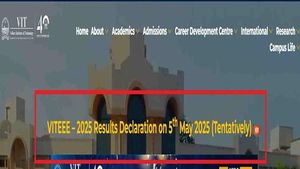On April 27, 2025, Friedrich Merz, the designated Chancellor of Germany, is making significant strides in assembling his future cabinet, with key appointments expected to reshape the country's political landscape. According to reports from the portal Table Media, CDU politician Johann Wadephul, 62, is poised to become the new Foreign Minister, while Karin Prien, 59, currently serving as the Education Minister of Schleswig-Holstein, is in line to take over the federal education portfolio.
This anticipated cabinet formation comes as Merz prepares to assume office following his election on May 6, 2025. The appointments reflect a strategic choice to prioritize expertise and loyalty over traditional regional representation, defying the long-standing principle of ensuring diverse representation from Germany's federal states within the cabinet.
Wadephul's selection as Foreign Minister is particularly notable, as he would be the first CDU member to hold this position since the era of Gerhard Schröder, who served from 1969 to 1974. A seasoned politician, Wadephul has been a member of the Bundestag since 2009 and currently serves as the deputy chairman of the CDU/CSU parliamentary group, where he oversees foreign and defense policy. His recent engagements include meetings with foreign ministers from France, the UK, Italy, and Poland, indicating his readiness for the role.
During a visit to London on April 25, 2025, Wadephul discussed Europe’s involvement in U.S.-initiated peace talks regarding Ukraine with British Foreign Minister David Lammy. He also had a significant discussion with French Foreign Minister Jean-Noël Barrot in mid-April, further solidifying his credentials as a key player in international diplomacy.
Meanwhile, Karin Prien’s potential appointment as Education Minister aligns with her extensive experience in the field. Having served as Schleswig-Holstein's Education Minister since June 2017, Prien has been a prominent figure in educational policy. In 2022, she held the position of President of the Kultusministerkonferenz, which oversees education across Germany. Reports suggest she is already in the process of seeking personnel for her new role, indicating her proactive approach to the responsibilities ahead.
Despite the momentum behind these appointments, official confirmations remain pending. A spokesperson for the CDU declined to comment on the speculation, emphasizing that the party would reserve statements for the official presentation scheduled for Monday, April 28, 2025. This event will unveil the complete list of ministers selected for Merz's cabinet.
Merz's coalition government, which includes the CDU, the Bavarian-only CSU, and the center-left SPD, is set to take office in early May. The coalition agreement reached earlier in April stipulates that the CDU and SPD will each hold seven of the 17 cabinet-level ministerial positions, while the CSU will manage three. This arrangement reflects the balance of power following the parliamentary elections held in February 2025.
The upcoming cabinet presentation marks a pivotal moment for Merz as he seeks to establish a government that reflects both competence and stability. The appointments of Wadephul and Prien are seen as strategic moves to solidify the CDU's influence in key areas of foreign policy and education, respectively. Observers note that these choices could signal a shift in Germany's approach to international relations and domestic educational policy.
As the political landscape evolves, the implications of these appointments extend beyond mere titles. Wadephul's experience and connections in foreign affairs may enhance Germany's standing on the global stage, particularly in navigating complex issues such as the ongoing conflict in Ukraine. His assertive stance on allowing the use of German weapons in Ukraine further underscores his commitment to a robust foreign policy.
On the domestic front, Prien's expertise in education is expected to bring fresh perspectives to the federal education system, which has faced various challenges in recent years. Her established reputation as a dedicated educational leader positions her well to address pressing issues within the sector, including curriculum reforms and digital education initiatives.
The political dynamics within the CDU also play a crucial role in these appointments. Wadephul's loyalty to Merz is seen as a vital asset, providing the Chancellor with a trusted ally in foreign policy matters. As the CDU navigates its internal landscape, the selection of ministers who are both competent and loyal is essential for maintaining party unity and advancing Merz's agenda.
As the official announcement approaches, speculation continues about the final composition of Merz's cabinet. While Wadephul and Prien appear to be solid choices, the political landscape remains fluid, and last-minute changes cannot be ruled out. The upcoming presentation will not only clarify the leadership structure of the new government but also set the tone for Merz's administration as it embarks on its mission to address Germany's pressing challenges.
In summary, the anticipated appointments of Johann Wadephul as Foreign Minister and Karin Prien as Education Minister reflect Friedrich Merz's focus on expertise and loyalty as he builds his cabinet. The decisions made in the coming days will undoubtedly shape the future of Germany's domestic and foreign policies as the new government prepares to take office.






